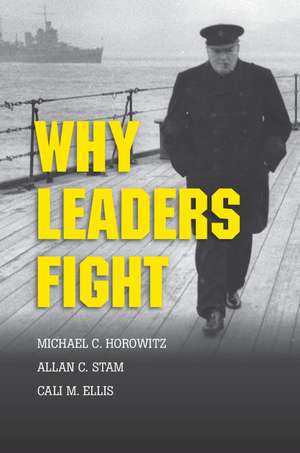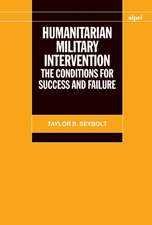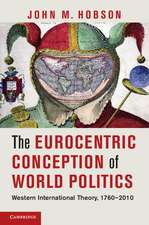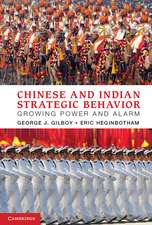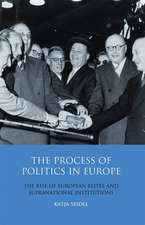Why Leaders Fight
Autor Michael C. Horowitz, Allan C. Stam, Cali M. Ellisen Limba Engleză Paperback – 28 sep 2015
| Toate formatele și edițiile | Preț | Express |
|---|---|---|
| Paperback (1) | 235.84 lei 6-8 săpt. | |
| Cambridge University Press – 28 sep 2015 | 235.84 lei 6-8 săpt. | |
| Hardback (1) | 553.96 lei 6-8 săpt. | |
| Cambridge University Press – 28 sep 2015 | 553.96 lei 6-8 săpt. |
Preț: 235.84 lei
Nou
Puncte Express: 354
Preț estimativ în valută:
45.14€ • 46.100$ • 38.14£
45.14€ • 46.100$ • 38.14£
Carte tipărită la comandă
Livrare economică 10-24 martie
Preluare comenzi: 021 569.72.76
Specificații
ISBN-13: 9781107655676
ISBN-10: 1107655676
Pagini: 228
Ilustrații: 35 b/w illus. 5 tables
Dimensiuni: 153 x 229 x 11 mm
Greutate: 0.39 kg
Editura: Cambridge University Press
Colecția Cambridge University Press
Locul publicării:New York, United States
ISBN-10: 1107655676
Pagini: 228
Ilustrații: 35 b/w illus. 5 tables
Dimensiuni: 153 x 229 x 11 mm
Greutate: 0.39 kg
Editura: Cambridge University Press
Colecția Cambridge University Press
Locul publicării:New York, United States
Cuprins
1. How leaders matter; 2. Systematically evaluating leader risk; 3. Leader risk across geography and time; 4. The experiences that matter I: military, rebel, age, and education; 5. The experiences that matter II: childhood, family, and gender; 6. 'L'état c'est moi', … or is it?
Recenzii
'The authors deftly dissect a notoriously difficult problem at the intersection of political science, history and psychology: when do attributes of leaders shape decisions to use force? And they make a compelling case that, naysayers notwithstanding, personality matters.' Philip E. Tetlock, Annenberg University Professor, University of Pennsylvania
'Why Leaders Fight restores the role of leaders to its rightful place in explaining the factors lead to international conflict. By integrating insights from history with the tools of modern social science and international relations theory, the authors offer a more comprehensive and nuanced framework for understanding what causes nations to go to war - insights that will be valued by policymakers and scholars alike.' James B. Steinberg, Dean, Maxwell School of Citizenship and Public Affairs, Syracuse University and former US Deputy Secretary of State
'Scholars have struggled to study systematically what policymakers have long understood intuitively: that individuals matter in foreign policy. This landmark study bridges that gap, arguing that the life-experience leaders bring into office shape their behavior in predictable ways. The debates this book will generate will advance the field considerably and be fodder for conversations in the seminar room and the corridors of power.' Peter Feaver, Duke University, North Carolina
'With brand new data and innovative methods illuminated by compelling narratives of leaders in action, Why Leaders Fight helps transform the truism 'leadership matters' from slogan to science. When all the external and internal pressures are reckoned, there is still room for choice in the great matters of international politics. Horowitz, Stam and Ellis show how the life experiences of the individuals who make those choices appear to influence their judgment in systematic and consequential ways. Future scholars may well look back to this book as the beginning of the end of the idea that a social science of international politics could safely set aside the individual level of analysis.' William C. Wohlforth, Daniel Webster Professor of Government, Dartmouth College
'[The authors'] theoretical and empirical contribution to the study of leaders will be felt for years - and many more presidential election cycles - to come.' Elizabeth Saunders, H-Diplo
'Why Leaders Fight restores the role of leaders to its rightful place in explaining the factors lead to international conflict. By integrating insights from history with the tools of modern social science and international relations theory, the authors offer a more comprehensive and nuanced framework for understanding what causes nations to go to war - insights that will be valued by policymakers and scholars alike.' James B. Steinberg, Dean, Maxwell School of Citizenship and Public Affairs, Syracuse University and former US Deputy Secretary of State
'Scholars have struggled to study systematically what policymakers have long understood intuitively: that individuals matter in foreign policy. This landmark study bridges that gap, arguing that the life-experience leaders bring into office shape their behavior in predictable ways. The debates this book will generate will advance the field considerably and be fodder for conversations in the seminar room and the corridors of power.' Peter Feaver, Duke University, North Carolina
'With brand new data and innovative methods illuminated by compelling narratives of leaders in action, Why Leaders Fight helps transform the truism 'leadership matters' from slogan to science. When all the external and internal pressures are reckoned, there is still room for choice in the great matters of international politics. Horowitz, Stam and Ellis show how the life experiences of the individuals who make those choices appear to influence their judgment in systematic and consequential ways. Future scholars may well look back to this book as the beginning of the end of the idea that a social science of international politics could safely set aside the individual level of analysis.' William C. Wohlforth, Daniel Webster Professor of Government, Dartmouth College
'[The authors'] theoretical and empirical contribution to the study of leaders will be felt for years - and many more presidential election cycles - to come.' Elizabeth Saunders, H-Diplo
Notă biografică
Descriere
Using in-depth research on famous leaders, this book explores how their life experiences fundamentally shape the reasons why nations go to war.
